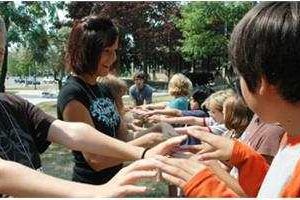Lately, there has been a lot of media coverage about helicopter parenting and how it affects our children. One might think that a generation of kids who have been indulged, protected, chauffeured, tutored, and celebrated more than any generation before would be confident, secure, and happy. What research shows, however, is that they are anxious, stressed out, and more emotionally fragile than any generation before.
Now, I’m not saying we have to go all “Lord of the Flies” and throw our kids out on to the street, nor do we want to remove our empathy and our support, but we do want to give them messages of competence and let our children know they can and will get through some of life’s tougher challenges. Negative experiences are inevitable and it’s impossible to always shield our children from them. Plus, if they don’t have some negative experiences from which to draw, they will not establish the necessary hardware in the brain designed to help them cope. In fact, the more we try to minimize upset the more the brain overreacts to smaller disappointments. Little problems are perceived as insurmountable mountains of turmoil; a crumbled muffin or a dropped ice cream cone can literally become the worst thing that has ever happened to an over-shielded child and she will react accordingly.
Within reason, it’s much better to teach kids how to handle negative experiences and how to learn from them. In the long run, constantly advocating for our children every time there is trouble, saying yes to too many requests, solving too many conflicts or removing too many obstacles is more damaging than helpful. We must let children try, fail and then cope with the natural consequences of their failures. Listening, being empathic and helping children understand and learn from these experiences is vital, as is giving them the message that you believe they will be okay. When we enable children to fully experience both the wins and losses in life, we give them the gift of steadiness that will last a lifetime.
Here are some tips to help you with this balancing act:
• Love them well. Promote a strong family connections, with tons of unconditional love and consistent nurturing to create positive attitudes and resilience.
• Show yourself and encourage emotional ownership. Let your child see that you also make mistakes and that you feel sad or frustrated sometimes. He will connect with you and recognize his own power to overcome adversity.
• Praise effort, not results. Compliment your child on her efforts and encourage her to measure herself against her own achievements.
• Don’t be a fixer—allow mistakes. If your child is upset or angry, do not rush to fix the situation. Listen as she expresses her feelings and then calmly demonstrate that it’s okay to feel that way sometimes. Then you can work on problem-solving. If your child procrastinates and leaves an assignment to the last minute and loses marks for lateness, do not interfere. The negative result is a natural consequence of her choices, and will help her concretely understand cause and effect.
• Stay neutral and avoid punishment. When your child does something wrong, make sure you listen to her point of view before you discipline then choose a fair and natural consequences. Yelling and punishing will lead the child to focus more on your behavior than her own.
Jennifer Kolari, M.S.W., R.S.W. Child and Family Therapist and Founder of Connected Parenting
Child and Family Therapist Jennifer Kolari is one of the nation’s leading parenting experts and the founder of Connected Parenting. Author of Connected Parenting: How To Raise A Great kid (Penguin Group USA and Penguin Canada, 2009) and You’re Ruining My Life! (But Not Really) Surviving the Teenage Years with Connected Parenting (Penguin Canada, 2011), Kolari is a regular guest on the He Said, She Said segment of the Steven and Chris show, and has appeared frequently Canada AM and Breakfast Television. Her advice can be found in many Canadian and U.S. magazines, such as Today’s Parent, Redbook, Parent Magazine, Canadian Family, and Chatelaine. Her entertaining workshops and insightful strategies, shared with warmth and humour, make her a highly sought-after speaker with schools, corportations and agencies throughout North America. Kolari has been helping children, teens and families get connected for twenty years.
She lives in Toronto with her husband and their three children.
IMAGE CREDIT: WSILVER/FLICKR CC




